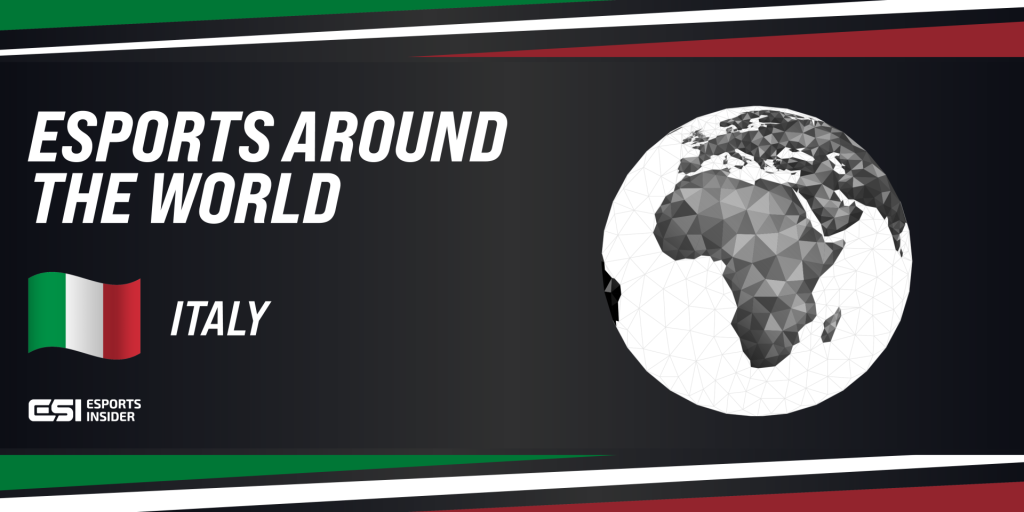Esports Around The World is a series of profiles outlining the esports ecosystem in various countries globally. The series ties into ESI’s international esports business events, which take place around the world.

Introduction
With 59m inhabitants, Italy has a higher population than Spain (47.5m) despite being a smaller country when it comes to landmass. This has resulted in the development of many dense urban areas where gaming culture can thrive in Italy. Despite this, the Italian esports ecosystem is arguably not as effervescent as it could be. Overall, the country has been largely unable to garner international attention in terms of events, competitive results and investments.
There’s a saying in the Italian community that goes: “Next year is going to be year zero for Italian esports, again”. This phrase is very relevant to understanding the market because it represents what stakeholders in this industry — organisations, tournament organisers, players and sponsors — feel due to Italy’s struggles to take competitive gaming beyond the nation’s boundaries.
Considering the passionate love for football in Italy, the eSerie A — EAFC’s virtual championship parallel to the Serie A — could have been a flourishing tournament in terms of investments and viewership but it brings in one-tenth of the spectators that the ePremier League does. Whilst EAFC has yet to develop into a tier-one esports title, one of the reasons for Italy’s lack of growth is due to exclusivity deals signed between football teams and publishers.
Six out of the 20 top teams in the country (Roma, Lazio, Inter, Milan, Napoli and Atalanta) are not in eSerie A in 2024 due to a deal with Konami and its eFootball franchise.
Setting aside football, traditional esports in Italy faces similar challenges. League of Legends and VALORANT both have national championships with talented teams and a promotion system that looks to bolster the ecosystem. Whilst the best compete at the European level, these organisations rarely make it to the latter stages. Italian team Macko Esports, however, did reach the semifinals of EMEA Masters Summer in 2023.
Riot Games’ MOBA was previously under the banner of PG Nationals tournaments (which included a Rainbow Six Siege competition, now discontinued) and recently rebranded as LIT (League of Legends Italian Tournament). The country’s VALORANT tournament on the other hand is called VCI Rinascimento (renaissance) and started only in 2023.
All of the above tournaments, including the Italian Rocket Championship, are organised by PG Esports, Italy’s biggest organiser. The company was purchased by the Amodei Group in 2020, a media organisation that owns two of the country’s most popular sports newspapers: Corriere dello Sport and Tuttosport. The other big tournament organiser in Italy is ProGaming which was acquired by Freaks4u Gaming GmbH in 2021 and handles ESL’s esports activities in Italy, Switzerland and Austria.
These two organisers face similar issues as other European regional esports scenes — creating a sustainable ecosystem. Whilst countries like Spain, Germany and France have managed to somewhat navigate these difficulties, Italy has still yet to cultivate a strong regional following with its highest regional LoL viewership being 16,400 during PG Nationals 2021 Summer.
Despite Italy’s structural developments falling short, individual athletes have found a way to the top of the world in many competitions. Riccardo ‘Reynor’ Romiti is a world champion of Starcraft 2, Marco ‘Vengeur’ Ragusa is a world champion in Quake, Daniel ‘Dannymado’ Madonia has been one of the top 10 players in the world of Tekken for more than five years and Francesco ‘kuxir97’ Cinquemani played at the elite level of Rocket League for many years. There are also a few Italians that are either world or regional champions in the Pokémon video games competitive scene.
Since its foundation in 2017, QLASH has also gone on to become the country’s biggest esports organisation. Very active in the Spanish market, the esports team and grassroots tournament organiser plays an important role in bridging the gap between mainstream brands and competitive gaming by providing the tools and infrastructure necessary to enter the sector. One notable example is AQM, its partnership between AC Milan and QLASH for a virtual football team that also birthed a Brawl Stars trio that managed to get to the World Finals in 2021.

Government recognition
One of the reasons that Italy struggles with its esports industry is because of the government’s lack of intervention in the matter. In 2024 the very first auditions in the Italian parliament were held about the videogame competitive sector but led to no concrete action.
Due to game of chances laws from the late ’60s and ’70s, it’s quite hard to organise tournaments with enough prize money to attract top talent in Italy: this is one of the reasons why, internationally, the country struggles to get investments or be an attractive stage for big events.

Notable Tournaments & Leagues
Italy shines mostly on the national stage with almost no international events taking place.
| eSerie A | Lucca Comics and Games |
| Italian Rocket Championship | Milan Games Week |
| League of Legends Italian Tournament LiT | VCL Rinascimento |

Notable Esports Organisations
Note that this is a non-exhaustive list and exclusion does not signify an org is not notable.

National Association(s) / Federation(s)
Note that inclusion in this list does not suggest any acknowledgement from ESI of its authority, works, or official capacity.

Education initiatives
Italy has rapidly growing high school and university leagues that attract hundreds of players every year. There are no official courses of studies focused on esports but many media-oriented schools are starting to look at the subject through workshops and seminars.
This is a preliminary country profile and will be augmented with additional information over time. If you have any suggestions or feedback for this profile, please get in touch at [email protected]. First published: April 23rd 2024.


